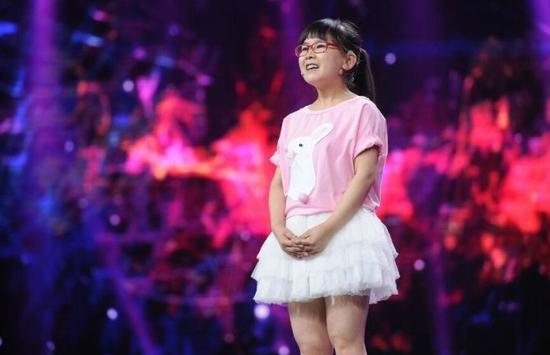
Wu Xiuju takes part in a TV show. (File photo)
What would you do if your body stopped growing at age 8?
For Wu Xiuju, 26, the answer was simple: she was determined to change the way the world saw her.
Wu was eight when she was diagnosed with dwarfism in 1998. No matter how much she ate, she grew only slowly.
She studied hard in school and got good grades, but she felt a sense of discrimination growing even as her body stopped.
It was only when she met a group of autistic children that she realized her small stature could bring trust and respect.
"I was very surprised by these unusual children when I first met them. The reaction was quite similar to those who suddenly realize I am actually 26," says Wu.
In a country where opportunities for people with her condition are limited, Wu wants to prove that small people can make great contributions to the world.
CHILDHOOD DREAMS
Born in a small village in northeast China's Heilongjiang Province, she was the youngest daughter of her family. Her four sisters are all taller than 160 cm.
Her parents spent years taking Wu from city to city to see doctors. They were told her growth hormone secretion was insufficient and she would eventually stop growing.
The family tried various remedies, including calcium tablets, herbal medicines and hormone injections for a decade. As an 18-year-old high school student, she remained 128 cm tall, the height of an 8-year-old.
Wu dreamed that someday she would suddenly grow: "I dreamed of having a climbing race with my father, trying on my mother's pretty dresses, and joining my sister's party, telling everyone that I had defeated the little monster and come back."
However, she seldom felt self-pity. Her childhood was full of love and care. In high school she sat at a specially shortened desk. She got a free tailored school uniform and she had many friends and praise from her teachers.
"At that time my world looked small, but very warm," Wu says.
CRUEL GIBES
In 2009, Wu enrolled at Heilongjiang University of Science and Technology, majoring in project accounting, which had few female students. Her teacher once recommended her for a paid internship. "I felt a sense of accomplishment. I thought I had a future," she recalls.
But she struggled to find employment after graduation.
"I was ashamed. People of my age were supporting their families, but I had to live on my parents and sisters. "
She left her hometown to deliver resumes to more than 50 companies in the cities of Harbin, Beijing and Tianjin, but all her interviews ended in less than 5 minutes.
One interviewer joked, "If I employed you, I would be criticized for hiring a child worker."
A few months later, she got an offer from a Tianjin engineering company. She spent days and nights remembering design drawings and her colleagues called her "a walking computer".
To accurately measure a construction site, she insisted on climbing more than 70 meters up loose scaffolding.
"I was trembling and scared to look down," she recalls. "I did it to show my boss that I could do things normal people could."
She was exhilarated when she received a difficult assignment and worked overtime for two months. But when it was almost finished, Wu was told it was no longer needed.
"I was totally numb," she remembers. She cried. "Why should I be treated all the time as a child?"
Wu quit and looked for a new job. Her sisters tried to persuade her to accept that discrimination exists, but she refused to accept it, saying, "I will change the way they see me."
A NEWFOUND ADVANTAGE
In January 2015, Wu was with friends when she was introduced to a group of autistic children. She discovered that her size - the weakness she would not accept - was an advantage. She played with them like a sister. The children were relaxed and treated her as a friend.
Wu tried to teach them to engage with ordinary children. Any little progress made her and their parents happy. More importantly, she won trust and respect that she had seldom experienced before.
Wu underwent professional training through a non-governmental organization in Shanghai, learning about autism and dealing with autistic people.
She spends whole days in class, reading, and playing. She dresses children, feeds them and wipes their noses in kindergarten.
Wu is also a champion of fairness and respect for autistic children on social media: "They are the world's kindest people; they cannot cheat, cannot deceive or attack others. Discrimination against them is a tumor in this society."
Every week, she spends at least three mornings or afternoons teaching autistic kids, earning more than 5,000 yuan a month - not much in Beijing, but double her previous wages.
"In the past, I was loath to say I was little," Wu said in a TV interview this month. "But now in my work, I turn my physical defect into a strength. I find my value through it."
China's State Council on August 17 released a plan for disability-related development from 2016 to 2020, describing disabled people as key "participants, constructors and beneficiaries" of a more all-round prosperous society.
The plan urges governments to step up legislation to protect them and supervise the employment, education, social benefits and other aspects of disabled people's lives.
Wu is planning to establish an autism studio, where people like her can become teachers.
"I believe I have special mission in the world," Wu says. "Let me accomplish it."


















































